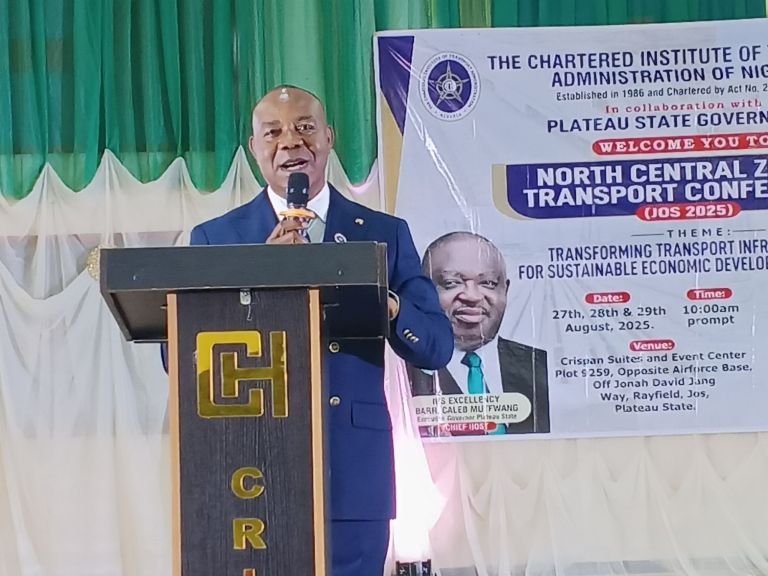From Tongnaan Bawa, Jos
The Chartered Institute of Transport Administration of Nigeria (CIoTA), in collaboration with the Plateau State Government, has convened the North Central Zonal Transport Conference 2025 in Jos, the Plateau State Capital.
With the theme: “Transforming Transport Infrastructure for Sustainable Economic Development of Nigeria.”
Our correspondent reports that the event brought together policymakers, industry leaders, stakeholders, and experts to deliberate on strategies for repositioning transport infrastructure as a driver of economic growth.
Declaring the conference opened, Plateau State Governor Caleb Mutfwang said the vision of the Plateau State plans to build a modern, interconnected, and sustainable transport system that will stimulate commerce, attract investments, create jobs, and improve the overall quality of life for citizens.
Represented by the State Head of Service, Stephen Gardong, underscored the importance of transport to the economic, social, and cultural integration of the North Central region and Nigeria at large.
He highlighted ongoing initiatives, including the rehabilitation and expansion of major roads across the three senatorial zones, the introduction of the Tin City Metro Bus Service which currently transports over 20,000 commuters daily, and efforts are on to digitize transport operations through smart ticketing systems and fleet tracking technologies.
Mutfwang also emphasized the state’s partnership with the Nigerian Railway Corporation for the revival of the Jos metropolitan train service, as well as the signing of a Memorandum of Understanding with the Federal Airports Authority of Nigeria (FAAN) to expand the Yakubu Gowon Airport into a cargo hub to ease the movement of Plateau’s agricultural produce.
According to him, these projects demonstrate the state government’s commitment to aligning with national policies and international standards in building a transport system that is safe, affordable, reliable, and environmentally sustainable.
He called on CIoTA and other stakeholders to partner with Plateau in driving a collective vision for the North Central region and the country at large.
In his remarks, the Plateau State Commissioner for Transport, Jatau Gyang, outlined further strides being made in the sector under the current administration. He noted that public-private partnerships are being pursued to develop modern bus terminals and intercity parks, while the state is finalizing a Plateau State Transport Policy to harmonize regulations and ensure safety enforcement. He added that the reforms were designed to reduce travel time, enhance trade, and expand mobility options for rural and urban dwellers.
The Chairman of Council, CIoTA, Prince Segun Ochuko Obayendo, commended Plateau State for its transport friendly policies and investments. He linked these initiatives to the Five Pillars of Sustainable Urban Mobility safety, security, predictability, affordability, and sustainability urging other states in the region to move collectively rather than in isolation. He stressed that without professionalism and regulation, transport infrastructure would continue to face misuse, inefficiency, and abuse.
Prince Obayendo further called for the adoption of intelligent transportation systems, cross-state data integration, and stricter regulation of inland waterways, pointing out that recurring accidents and inefficiencies in road and water transport are linked to poor enforcement and lack of professional training for operators.
Speaking on the significance of the event, the General Manager of Plateau Express Service, Samuel Gwott, said the conference was timely and affirmed Plateau’s position as a pioneer in regional transport transformation. He pointed to the success of the Tin City Metro Bus Service, which has reduced the burden of urban mobility for thousands of residents daily, as well as improved air links that now make flights between Jos and Lagos more frequent and accessible. He also noted that the state is gradually building a digitized, safe, and reliable transport system that will serve as a model for other states in Nigeria.
The conference continues with technical sessions, paper presentations, and panel discussions from experts, and is expected to end with a communiqué outlining practical recommendations for sustainable infrastructure, policy reforms, and regional collaborations to strengthen Nigeria’s transport sector.


